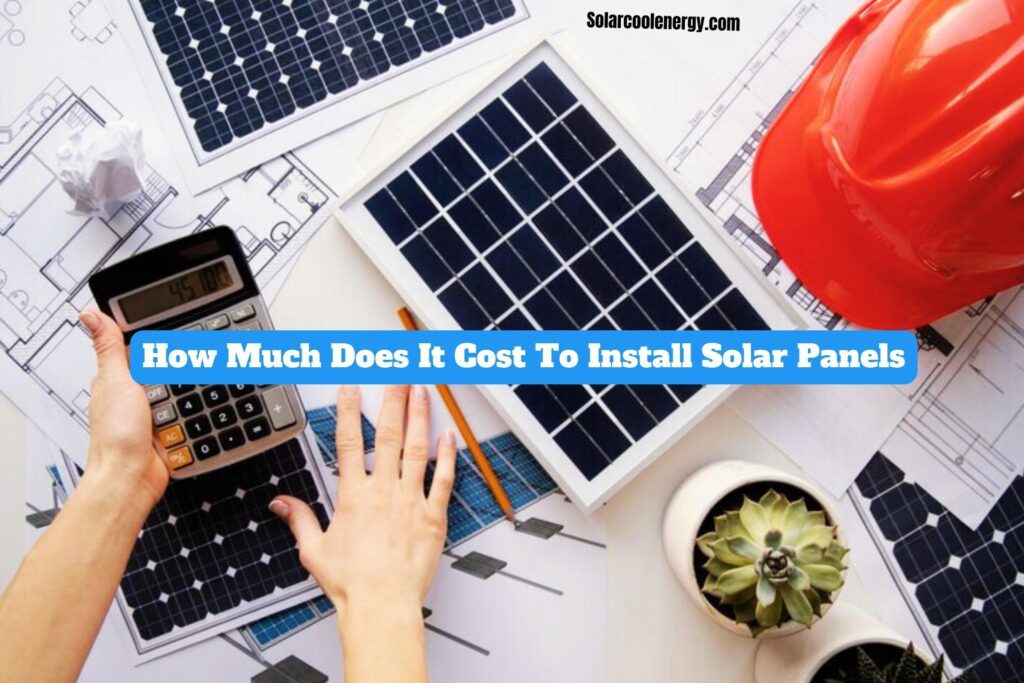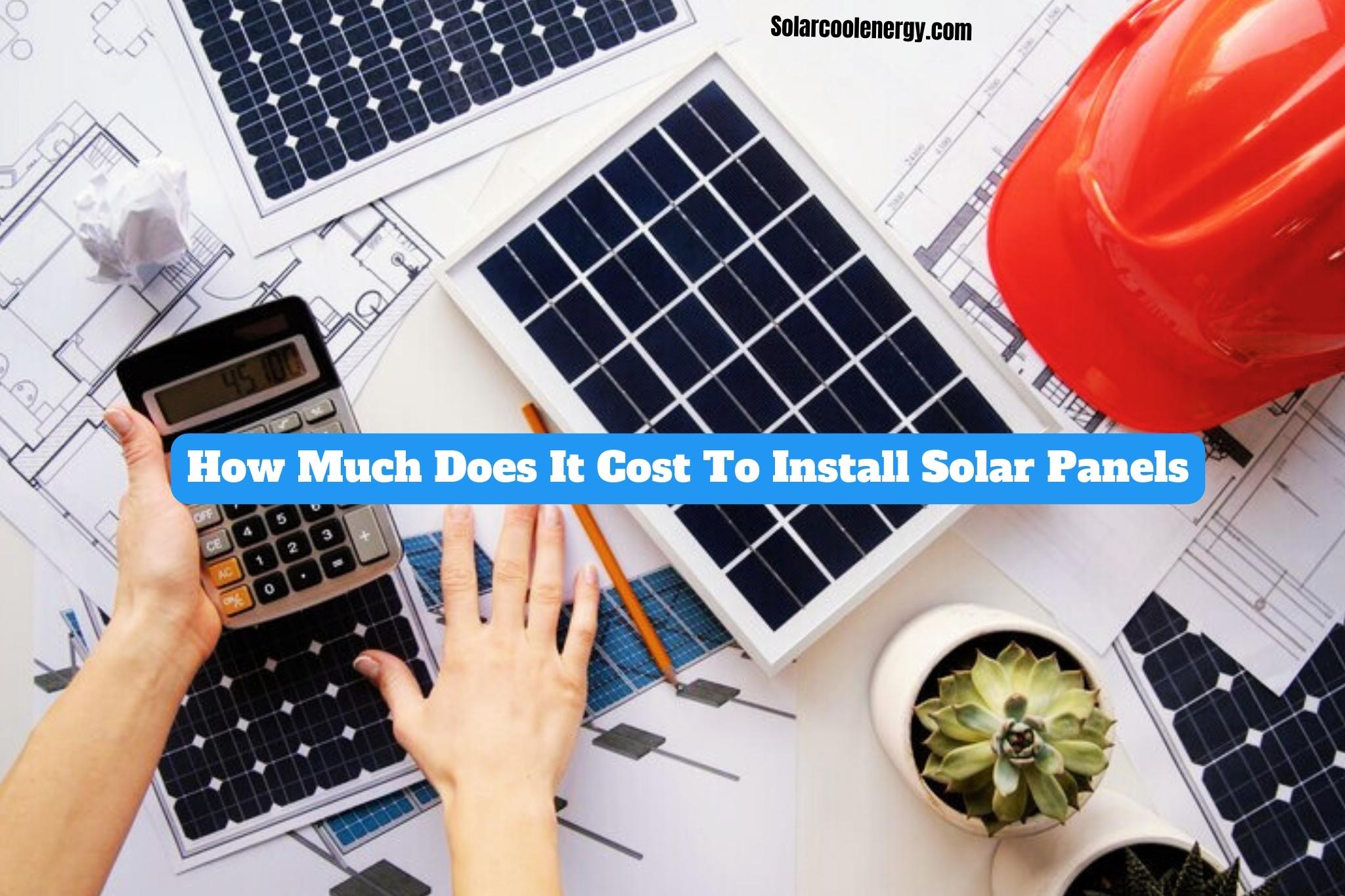The Cost To Install Solar Panels varies depending on various factors such as location, size of the system, and specific installation requirements. However, on average, the cost of installing solar panels can range from $15,000 to $25,000 for a typical residential system.
Installing solar panels can be a cost-effective and environmentally friendly solution for homeowners looking to generate their own electricity. While the exact cost of installation depends on several factors, such as location and system size, the average cost falls within the range of $15,000 to $25,000.
Despite the initial investment, solar panels can lead to long-term savings on energy bills and potentially even earn homeowners money through various incentives and rebates. In addition, solar energy helps reduce carbon emissions, making it a sustainable and eco-friendly choice for homeowners. This article will explore the factors that impact the cost of solar panel installation and discuss the potential financial benefits of investing in solar energy.

Solar Panel Installation Cost Breakdown
Installing solar panels is a smart investment both for the environment and for your wallet. But before you take the plunge, it’s important to understand the cost breakdown of solar panel installation. By knowing the key factors that affect the installation costs, you can make an informed decision and start enjoying the benefits of solar energy.
Initial Assessment And Potential Savings
The first step in the solar panel installation process is an initial assessment of your property. This typically involves a site visit by a solar panel installer who will evaluate your roof’s condition, angle, and orientation, as well as your energy consumption. Based on this assessment, they will determine the number of solar panels needed and provide you with a cost estimate.
During this assessment, it’s also important to consider the potential savings that solar panels can offer. If you reside in a location where power prices are high, solar energy may help you save a lot of money on your electricity bills. By generating your own clean energy, you can save money on your monthly electricity expenses and potentially even earn credits by selling excess power back to the grid.
Key Factors Affecting Installation Costs
Several factors can influence the overall cost of solar panel installation:
- System Size: The size of the solar panel system you choose will directly impact the installation cost. Larger systems will require more panels and more labor to install.
- Type of Panels: There are various types of solar panels available, each with its own price range. High-efficiency panels tend to be more expensive but can generate more electricity in the same amount of space.
- Roof Condition: If your roof needs repairs or reinforcement before installing solar panels, it can add extra costs to the installation. It’s important to ensure that your roof is in good condition to support the weight of the panels.
- Permitting and Inspection: Obtaining the necessary permits and inspections from local authorities is a crucial part of the installation process. These fees can vary depending on your location and can contribute to the overall installation cost.
- Incentives and Rebates: There are often government incentives and rebates available for installing solar panels, which can help offset the installation cost. It’s important to research and take advantage of these opportunities.
By considering these key factors, you can get a better understanding of the installation costs associated with solar panels. Remember, investing in solar energy not only helps you save money in the long run but also reduces your carbon footprint, making it a win-win situation for you and the environment.
Understanding Solar Panel Pricing
Understanding solar panel pricing can be crucial when considering the cost to install solar panels. Factors such as the size of the system, installation variables, and the type of solar panels used can all impact the overall price. By exploring different options and calculating potential savings, individuals can make informed decisions about investing in solar energy.
Types Of Solar Panels And Their Prices
When it comes to understanding solar panel pricing, it’s crucial to familiarize yourself with the different types of solar panels available in the market. Solar panels come in three primary varieties: thin-film, polycrystalline, and monocrystalline.
Monocrystalline Solar Panels: These solar panels are made from a single crystal structure, resulting in high efficiency and sleek black appearance. They are the most expensive among the three types, with prices ranging from $1,000 to $1,500 per panel.
Polycrystalline Solar Panels: Polycrystalline panels are made from multiple silicon crystals, which makes them less efficient compared to monocrystalline panels. However, they are more affordable, with prices ranging from $800 to $1,200 per panel.
Thin-Film Solar Panels: Thin-film panels are the least efficient type of solar panels but are also the most affordable. They are made by depositing a thin layer of semiconductor material on a substrate. Prices for thin-film panels range from $500 to $800 per panel.
Price Variations By Brand And Manufacturer
The price of solar panels can also vary based on the brand and manufacturer. Different brands offer varying levels of quality, efficiency, and warranty coverage. Here are a few examples of well-known solar panel brands and their average prices:
| Brand | Average Price Range per Panel |
|---|---|
| SunPower | $1,200 – $1,800 |
| LG | $1,000 – $1,500 |
| JinkoSolar | $800 – $1,200 |
It’s important to note that the prices mentioned above are just average ranges and may vary based on factors like panel size, wattage, and installation requirements.
Assessing Home Solar Panel Costs
Assessing home solar panel costs is crucial when considering the installation of solar panels. Understanding the pricing factors and evaluating the overall expenses associated with solar panel installation helps homeowners make an informed decision about going solar.
Evaluation Of Your Home’s Solar Potential
Before determining the cost of installing solar panels on your home, it’s essential to evaluate your home’s solar potential. Factors such as the orientation and slope of your roof, the amount of shade in the area, and the available space for panel installation all contribute to the overall efficiency of your solar system.
Assessing your home’s solar potential involves analyzing these variables to determine the suitability of solar panel installation. Consulting with a professional solar installer can help you accurately evaluate your home’s solar potential and make informed decisions regarding the installation process.
Calculating The Price Based On Home Size
The size of your home plays a significant role in determining the cost of solar panel installation. Larger homes generally require more panels to meet their energy needs, resulting in higher installation costs.
Calculating the price based on home size involves considering the total square footage of your home. It’s crucial to measure the available roof space for solar panel placement accurately. This allows solar installers to determine the number of panels required and calculate the installation cost accordingly.
Proper Pricing
When it comes to assessing home solar panel costs, it’s important to find a balance between quality and affordability. While opting for cheaper installation may seem appealing, it’s crucial to consider the long-term benefits and performance of the system.
Choosing a reputable solar installer who offers competitive pricing and high-quality equipment ensures that you receive a reliable and efficient solar system. Remember, solar panels are a long-term investment that can generate significant savings on your electricity bills over time.
Investing in solar panels offers numerous advantages such as reduced energy costs, environmental sustainability, and potential tax incentives. By accurately evaluating your home’s solar potential, considering the size of your home, and selecting a reputable installer with fair pricing, you can make an informed decision about solar panel installation that maximizes your energy savings and benefits.
Installation And Operational Expenses
Installing solar panels involves not only the cost of the panels themselves but also various installation and operational expenses. These additional expenses include labor and installer fees, permits, wiring, and equipment. Understanding and budgeting for these costs is crucial for a successful solar panel installation project.
Labor And Installer Fees
When it comes to installing solar panels, one of the major expenses is labor and installer fees. Hiring professional installers ensures that the panels are properly installed and connected to your home’s electrical system. The labor costs typically include the installation team’s wages, travel expenses, and any additional expenses related to the installation process.
The installer fees, on the other hand, cover the company’s overhead costs, such as insurance, licensing, and warranty. It is important to choose a reputable installer who offers competitive fees without compromising on the quality of work.
Additional Costs: Permits, Wiring, And Equipment
In addition to labor and installer fees, there are several other costs to consider when installing solar panels. These include permits, wiring, and equipment expenses.
Permits are required by local authorities to ensure that your solar panel installation complies with building codes and safety regulations. The cost of permits varies depending on your location and the complexity of the installation. It’s important to factor in this expense when budgeting for your solar project.
Wiring and equipment costs include the materials needed to connect the solar panels to your home’s electrical system. This includes wiring, connectors, inverters, and other necessary components. The cost of these items will depend on the size of your solar array and the specific equipment chosen.
Summary
In summary, the installation and operational expenses associated with installing solar panels include labor and installer fees, permits, wiring, and equipment costs. It is important to consider these additional expenses when budgeting for a solar panel installation project. By taking into account all the associated costs, you can ensure a successful and cost-effective solar panel installation.

Credit: Youtube
How Much Does It Cost To Install Solar Panels
Installing solar panels is a wise investment for homeowners looking to reduce their carbon footprint and save money on their energy bills. However, one of the most common questions asked is, “How much does it cost to install solar panels?” This post will give you a better idea of the total cost of installing solar panels, provide a thorough cost analysis, and look at possible rebates and incentives.
Comprehensive Cost Analysis
When it comes to installing solar panels, the cost can vary depending on various factors. These factors include the size of the solar system, the location of the installation, the type of panels used, and any additional equipment needed. On average, the cost of installing solar panels might vary from $10,000 to $30,000. Here is a breakdown of the cost of installing solar panels:
| Item | Cost |
|---|---|
| Solar Panels | $3,000 – $15,000 |
| Inverter | $2,000 – $5,000 |
| Mounting Equipment | $1,000 – $3,000 |
| Installation Labor | $2,000 – $7,000 |
It is important to keep in mind that these costs are estimates and may vary depending on your specific situation. It is recommended to get quotes from multiple solar installers to get a better idea of the cost for your home.
Potential Rebates And Incentives
One of the advantages of installing solar panels is the potential for rebates and incentives that can help offset the initial cost. Here are some potential rebates and incentives for installing solar panels:
- Solar Investment Tax Credit (ITC): This federal tax credit allows homeowners to deduct a percentage of the cost of their solar system from their taxes. Currently, the ITC is set at 26% but is expected to decrease in the coming years.
- State and Local Incentives: Many states and local municipalities offer additional incentives, such as rebates, grants, and property tax exemptions, to encourage homeowners to go solar. These incentives vary by area but may greatly lower the total cost of installing solar panels.
- Net Metering: Net metering allows homeowners with solar panels to sell excess energy back to the grid, effectively reducing their electricity bills. This can result with substantial savings over time.
It is important to research and understand the available rebates and incentives in your area to maximize your savings when installing solar panels.
By considering the comprehensive cost analysis and potential rebates and incentives, you can get a better understanding of how much it will cost to install solar panels for your home. While the initial cost may seem daunting, the long-term savings and environmental benefits make it a worthwhile investment.

Credit: Youtube
Frequently Asked Questions For How Much Does It Cost To Install Solar Panels
How Much Is A Solar System For A 2000 Sq Ft House?
The cost of an array of solar panels for a 2000 sq ft house varies. Factors like location, available incentives, and specific energy needs affect the price. On average, the cost ranges from $12,000 to $30,000. Consult with a solar installation provider for an accurate estimate.
Do You Really Save Money Installing Solar Panels?
Installing solar panels can indeed save you money. By harnessing the power of the sun, you can reduce or eliminate your reliance on traditional electricity sources, resulting in lower energy bills. Additionally, many areas offer incentives such as tax credits or rebates for installing solar panels, further increasing your savings.
How Long Does It Take Solar Panels To Pay For Themselves?
The average payback period for solar panels is six to ten years, depending on various factors.
What Is The Average Cost Of A 1 Solar Panel?
The average cost of a single solar panel is around $2. 62 per watt.
Conclusion
Installing solar panels can be a great investment for homeowners looking to save on their energy bills and reduce their carbon footprint. However, the cost of solar panel installation can vary depending on various factors such as the size of the system and the location of the property.
By considering these factors, homeowners can get a better understanding of how much it would cost to install solar panels. It’s important to weigh the upfront installation costs against the long-term savings and benefits of going solar. Researching and consulting with reputable solar installers can help homeowners make an informed decision about whether solar panels are worth the cost for their specific circumstances.

